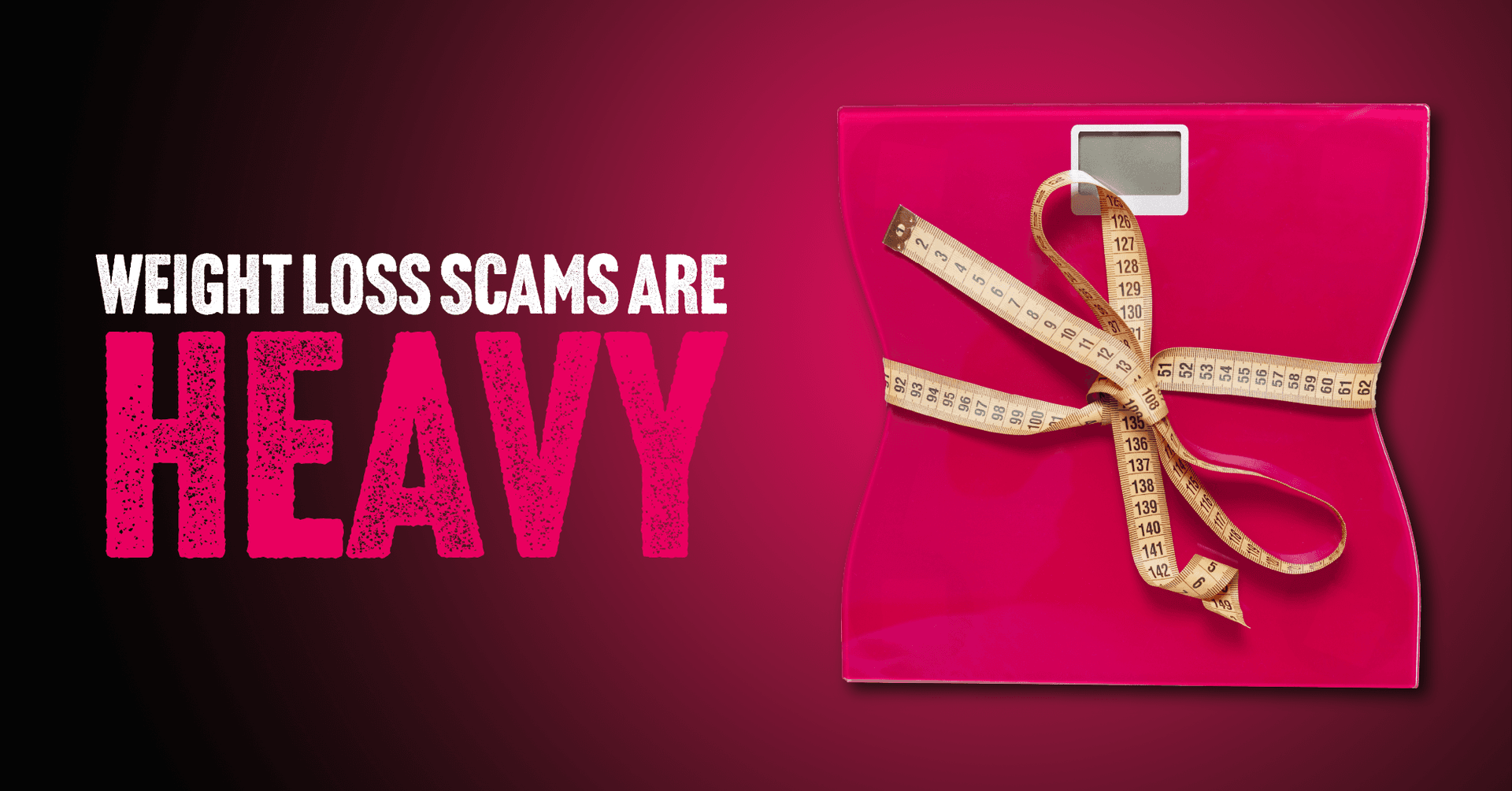- Blog
- Privacy
Weight loss scams are heavy
Weight loss is a huge industry and scammers are using it to create lots of scams about diet pills, ‘miraculous’ weight loss solutions and non-exercise weight control amongst others.By Rightly
5 min read

Action Fraud, the National Fraud and Cyber Crime Reporting Centre, recently issued a warning of a weight loss scam targeting people for their personal information. The organisation says it has received more than 300 reports about scam emails claiming to sell health and weight loss products. If you’ve seen an email like this, be wary.
It’s not just emails. The scammers use:
- telemarketing calls
- text messages
- social media platforms
- blogs
- fake news websites
- banner ads
All to lure consumers into purchasing seemingly miraculous weight loss products.
There are several examples where the scammers say that a product has appeared on TV’s Dragons Den, claiming the Dragons have unanimously invested millions of pounds in ‘miracle’ diet pills - the biggest Dragons Den deal in history they say - but it’s a completely false claim.
Fake endorsements by other celebrities continue to trick people into thinking they’re buying genuine, tested and effective products. False endorsements are used with false claims, such as that women can lose one and a half stone in a single month by taking a particular pill.
Contained somewhere in the ad, there’s usually a weblink that, if clicked, takes you to a bogus site that asks for personal information including
- age
- gender
- current weight
- goal weight
The page shows a countdown clock alongside the fake reviews about the product, designed to put pressure on you to act fast - to go ahead without thinking about what information you are handing over.
Next, inevitably, you’re asked for your payment information. Once you’ve entered it, it’s captured by the scammer. You could then see money start to leave your account and the product will never arrive. They might even try to steal your full bank details and in some cases, load malware into your computer or other device.
Once you’ve completed the purchase process, there’s no guarantee an item will ever arrive.
Reality check
The first and most important thing to remember if you get targeted with one of these products is that any promise of miraculous weight loss is simply untrue. Products that promise rapid weight loss are always a scam.
Similarly, other weight loss ads proposing application of electronic devices to your skin to promote weight reduction are also false. Here again, nothing you can wear or, for example, or a cream you apply to your skin will cause you to lose weight.
Scammers use emails in particular that are designed to steal personal and financial information. Usually, there are links in these emails leading to malicious websites and if you receive a suspicious email, don’t click any links.
Spot false promises and stories
Dishonest advertisers and scammers will say almost anything to get you to buy their weight loss products, whether the pills or cream or device are real or not. Here are some of the false promises you’ll often see in weight loss ads:
- You can lose weight without dieting or exercising
- You don’t have to watch what you eat to lose weight
- If you use this product, you’ll lose weight permanently
- To lose weight, all you have to do is take this pill
- You can lose 30 pounds in 30 days
- This product works for everyone
- Lose weight with this patch or cream
In your social media feed, or sometimes in banner ads and ‘click-bait’ posts, scammers place false stories tempting people to click on a link to a new ‘wonder’ product. You may have seen so-called “news” reports about how an ingredient, for example, garcinia cambogia or gonji berries have just been discovered as radically effective for weight loss. But in fact, there’s no such new discovery, it’s all just designed to catch the unwary, dressed up as science. In one example currently online, it says “A top scientist at Stanford University has discovered an "Ice Hack" that instantly turbo-charges your metabolism by 450% or more”. Completely false.
The scammers will sometimes go further, writing fake reviews about how amazing their product is. They often use images to illustrate dramatic weight loss, those classic ‘before’ and ‘after’ shots. Often, these images are stolen from other places, simply stock or photoshopped images. They’re almost certainly not photos of people who actually used the product they’re pushing.
Scammers are well known for creating fake websites that mimic authentic news outlets or organisations. It’s not difficult to grab the logo of an organisation, create a domain name very similar but not quite the genuine thing, and create the hooks on which they catch scam victims.
They use these very genuine-looking websites to dupe users into believing that they are real. But, links on the site go to other sites that are set up and ready to steal your information, deliver malware or gain access to your phone or computer.
Not just pills and creams
You may have seen ads for electronic devices or muscle stimulators promising that you’ll have a six pack in no time! Some studies have shown that these devices can tone or strengthen muscles temporarily, but have not been shown to do anything for weight loss. Scammers use ads promoting such items to capture your information.
Beware of ‘free trials’
Some scam products get promoted by offering “Free” trials. But they are often not free at all. Many people who have signed up for “free” trials for weight loss products have ended up paying a lot of money and fall into getting billed for recurring deliveries they didn’t want.
Danger diet
There’s evidence that some of these fake diet products could even hurt your health. Investigations have found that some weight loss products are tainted, containing potentially harmful drugs or other chemicals not even mentioned on the product label. Many of these products are targeted at weight loss and also bodybuilding.
What should you do
In general, if you receive an email that you were not expecting, proceed with caution. If you receive an email you believe to be suspicious, you should contact the real company or organisation directly. Don’t use any information from an email and never click any links contained in it. Navigate yourself directly to the company’s official website and check the information there. You can then also contact the real organisation and if necessary report the fake email.
Look after your data
Before a scammer can send you an email, they have to have that email address. Scammers get hold of email addresses in a number of ways including scraping data from social media accounts or buying data on the dark web that has been hacked in a data breach.
To reduce the chances of your data getting into the hands of scammers, you should get it deleted from any organisation that no longer needs it. You can get your data deleted from any company, in a single click, by using Rightly Protect. Our service is quick, simple and free.
Related Articles
- Blog
4 min read

Should a company data breach bother you?
October is Cyber Security Month. Just last month one of the biggest and most serious data breaches that has ever occurred, happened to Australia’s second largest telecom business. The breach has compromised almost half of the whole of the country’s population, leaving them exposed to serious risk of being scammed and the appalling prospect of identity theft. Could this happen in the UK? Have you ever switched provider? What happened to your data when you did?
- Blog
5 min read

Scammers in the marketplace shadows
Online marketplaces are a great way for buyers and sellers to interact and trade goods and services for money in a convenient, streamlined place with little or no friction. But of course, where there are transactions or systems to be exploited, you can bet a scammer has figured out a way to capitalise on it. And they are coming after you, so best be aware of how they’ll show up.